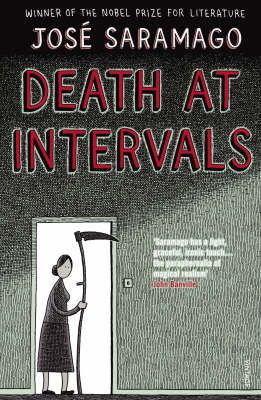 Death At Intervals (also published as Death With Interruptions) is an extremely surreal book by the Nobel Laureate, José Saramago. In a country (not necessarily futuristic), people have stopped dying one new year's day, in spite of illness, accidents and life in general.
The different strata of society react differently: people are initially joyous as they contemplate immortality; the religious people and the philosophers try debating it out - without death, what is the point of religion - and, the politicians, who try and figure out the socio-economic repercussions.
Death At Intervals (also published as Death With Interruptions) is an extremely surreal book by the Nobel Laureate, José Saramago. In a country (not necessarily futuristic), people have stopped dying one new year's day, in spite of illness, accidents and life in general.
The different strata of society react differently: people are initially joyous as they contemplate immortality; the religious people and the philosophers try debating it out - without death, what is the point of religion - and, the politicians, who try and figure out the socio-economic repercussions.
However, the implications of immortality are far severe than people initially realised, and while they resort to euthanasia, and taking relatives outside the country, in order to die a natural death, a new criminal organisation, the maphia, come into action, who provide the services of ensuring old, ill and suffering family members die.
The maphia would not be what it is had it failed to find a solution to the problem. It really is a shame, if you will allow us a brief aside, that the brilliant intellects leading these criminal organisations should have departed from the strait and narrow path of respect for the law and disobeyed the wise biblical precept that urges us to earn our daily bread by the sweat of our brow, but facts are facts, and while repeating adamastor's sad words, ah, but my heart is sick to tell the tale, we will set down here the distressing news of the trick deployed by the maphia to get round a difficulty which was, to all appearances, insoluble.
While the first half of this book asks the important philosophical questions about the importance of death, and debates euthanasia, the second half of the book has the anthropomorphic death herself as the narrator. The significance of "death" signing off with a "d" instead of "D" is also discussed, when she (yes, death is anthropomorphised as a female) sends a letter to a newspaper editor, where she says Death is far scarier and omniscient than she, herself.
She changes tactics, from ensuring no one dies to sending a letter to the victim a week prior to his death, so that he has sufficient time to wrap up his affairs. Of course, when it comes to death, a heads up might not be the best way forward....
I can't say I enjoyed the book despite its interesting premise though. It's not that I didn't enjoy it - I just found the writing really difficult to read at times (above quote withstanding). The punctuation is random, and even long conversations lacked quotations, so much so that I had to go back and re-read chunks to figure out the flow of the conversation.
Don't get me wrong - it is a fantastic book with captivating debates on politics, religion and economics, and I think it's one of those that would definitely be worth a re-read.
Have you read this book by Saramago? Or, any others? How do they compare? I think I'd like to try Blindness next....